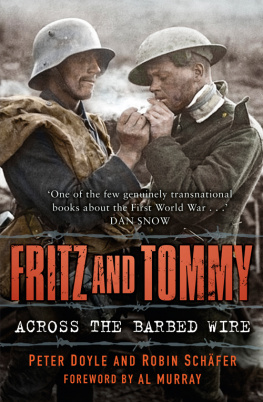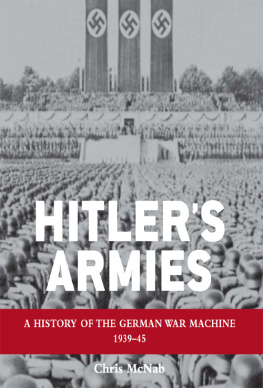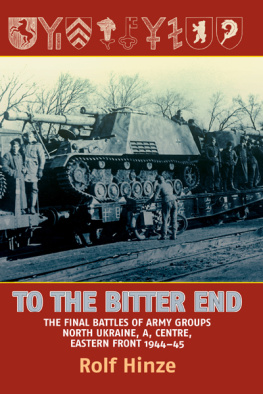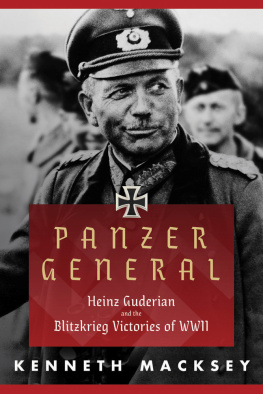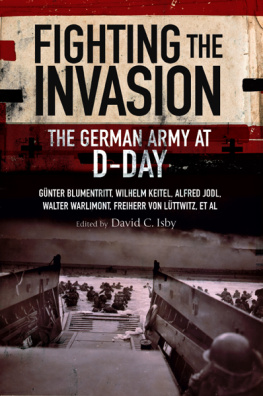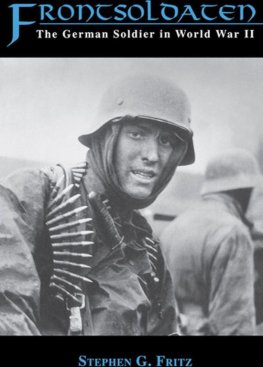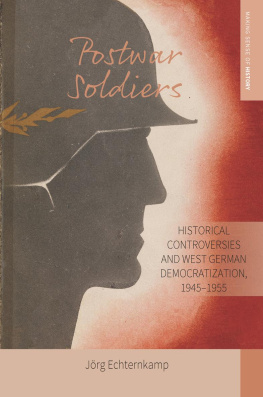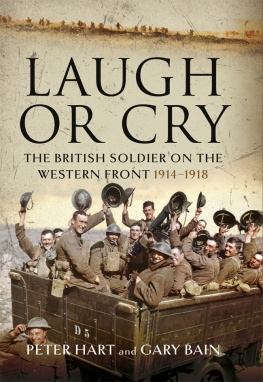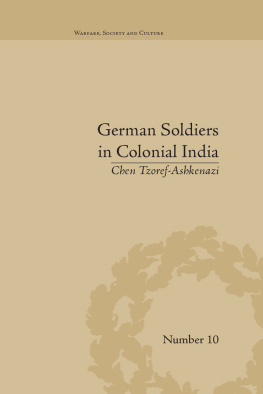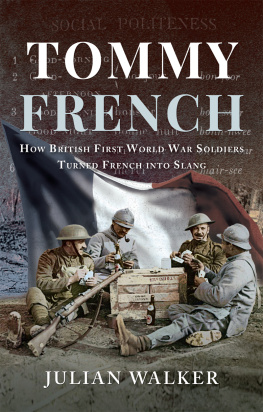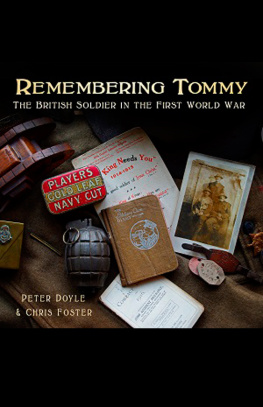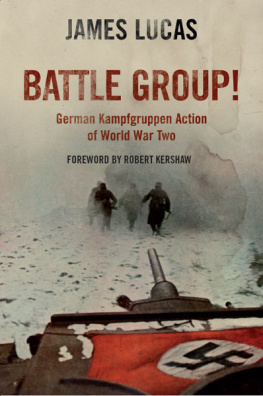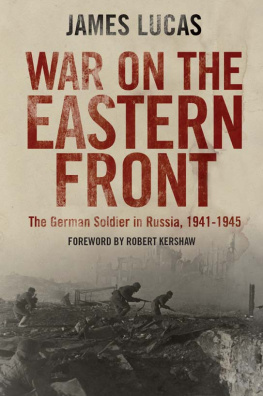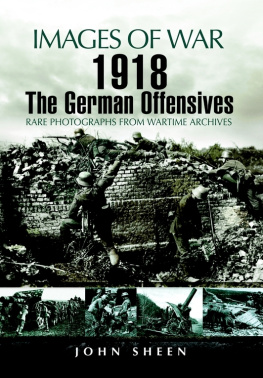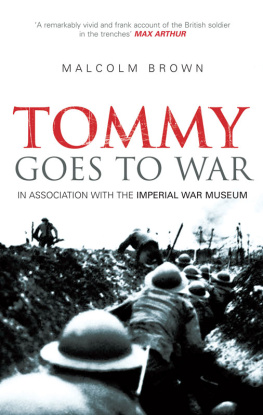

Fr unsere Eltern
The Great War has always been a story about two opposing sides. Here in the pages of Fritz and Tommy we at last have that story, told in stark relief and in a meaningful and often very moving way. In nearly forty years of reading about the Great War this is arguably one of the most important books I have come across. It is simply essential reading for anyone with an interest in World War One.
P AUL R EED , HISTORIAN
Fritz and Tommy ingeniously unpicks the traditional straitjacket of national memory in World War One by using diaries and letters home to show both the similarities and the differences between British and German soldiers. Engaging, poignant and hugely informative, it is an inspired concept, brilliantly executed.
R OGER M OORHOUSE , HISTORIAN AND AUTHOR OF T HE D EVILS A LLIANCE : H ITLER S P ACT WITH S TALIN , 1939-1941
In this excellent book Peter Doyle and Robin Schfer weave together personal testimony, memoirs and contemporary writing to illustrate the contrasts, similarities and shared experience of British and German soldiers on the Western Front. The result is a fascinating, thought-provoking and frequently touching story of men at war.
S PENCER J ONES , MILITARY HISTORIAN AND AUTHOR OF C OURAGE WITHOUT G LORY : T HE B RITISH A RMY ON THE W ESTERN F RONT 1915
This is a wonderful account of the day-to-day lives of the British and German soldiers who fought the Great War. It cuts through the gloss of a hundred years of distortion and propaganda to reveal the faces of the real men who lived and died in the mud and blood of the trenches.
G ILES M AC D ONOGH , HISTORIAN AND AUTHOR OF A FTER THE R EICH
Fritz and Tommy is a triumph. A time machine. Open it, step inside, and you are back in that hot distant summer of 1914. Travel with the combatants as they scribble their letters from those opening days of the war, to the shattered rubble of fallen empires and devastated landscapes of 1918. The young men are long gone. In this remarkable book they live again. Sit with them. Hear their tales.
M AJOR N IGEL P RICE , EX -7 TH G URKHA R IFLES , AS A NTHONY C ONWAY , AUTHOR OF THE C ASPASIAN NOVELS AND T HE M OON T REE
This remarkable book is a fitting memorial to the men and women of both nations who served in the Great War.
L ORD F AULKNER OF W ORCESTER , CHAIRMAN OF THE A LL -P ARTY P ARLIAMENTARY W AR H ERITAGE G ROUP
When it is peace, then we may view again
With new-won eyes each others truer form
And wonder. Grown more loving-kind and warm
Well grasp firm hands and laugh at the old pain,
When it is peace. But until peace, the storm
The darkness and the thunder and the rain.
C APT . C HARLES H AMILTON S ORLEY
K ILLED IN A CTION , L OOS , 13 O CTOBER 1915
We are grateful to all those who contributed to our work directly or indirectly. Petra Schuir, Werner Kodorra and Wilhelm Himmes allowed us to make use of their extensive collections of German wartime letters and diaries. Individuals gave us access to precious family diaries in their care: Kate and Gill Hutchinson for the moving letters and diaries of William Taffs, killed on the first day of the Battle of the Somme; Andy Nurse, custodian of the diaries of Pte J.H. Benn; Kenneth Bone for the 1914 diary of Pte H.W. Talbot; Paul Rodger for access to his grandfather Sgt J. Comptons diary; Martin Howard for his grandfather Cpl Albert Howards diary; and Pete Whitehead for his grandfather Pte Philip Whiteheads diary.
We thank Giles MacDonogh for allowing us to use his translations of German wartime poetry, and Vanessa Domizlaff, great-granddaughter of Feld-Oberpostmeister Georg Domizlaff, commander-in-chief of the German Field Post Service during the First World War, for help with the transcription of German handwriting of the period. Paul Reed is thanked for his help, advice and enthusiasm for the project; Nick Britten, Stuart Disbrey, Mike Edwards, Chris Foster, Taff Gillingham, Wytzia Raspe, Horst Schfer, Maximilian Seidler and Julian Walker also assisted us with wise words, advice and support. Jo de Vries at The History Press gave unflinching support and unequalled enthusiasm for the book at all its stages.
Contents
The First World War, as anyone sensible will tell you, is the event that birthed the modern world, that set the twentieth centurys tumultuous events in motion, that unleashed the forces that devastated the world as empires collapsed and new ones rose. While this all might be true, you might also say its somewhat impersonal. The First World War wasnt about tectonic plates grinding against one another so much as ordinary men facing each other across no-mans-land in countless battlefields all over the world, in a war that both sides saw as a war for survival.
Peter and Rob Tommy and Fritz, respectively have done what many have been unable to do in the wake of the First World Wars centenary, and put aside the whoever and, dare I say, the whatever about how the war began, and looked at those ordinary men and their attitudes. Diaries, letters home, written without the benefit of hindsight, without the outcome or the terrible butchers bill at the end of the war in mind.
Fritz and Tommy came from countries you might be tempted to describe as the same but different. Their armies had their own powerful traditions, and had spent the decades running up to the outbreak of war admiring each other and comparing themselves. When war came, both institutions were sorely tested by the deadlock that followed the personal accounts in Fritz and Tommy take us into these challenges and German and British soldiers continued to admire and compare as much as they were told to hate each other.
As the First World War becomes more distant in time, and the ancient animosities fade, a book like Fritz and Tommy helps to peel another layer from the historical onion. Theres lots to learn from this book, and maybe some of the glib answers about the First World War will be replaced by sterner questions. Why do men fight? And why, even when things are as bad as they were, do they continue to fight?
Al Murray
You have to know that in some places our trench is only 15 metres away from the enemy. You wont believe it, but last night a Tommy called us in German! Haben Sie Zigarren ? One of my men threw some over the parapet and they seemed to have reached their destination as a few minutes later something landed in our trench. First we thought it was a grenade, but it turned out to be a small metal tin full of chocolates! After that there was silence. The English are a lot different to the French. I will send you the tin as it is quite decorative! Has Werner been promoted yet? I hope to meet him in Cologne soon
L EUTNANT W ALTER B LUMSCHEIN , 3 F EBRUARY 1916
There has been no firing here today as far as I know as Fritz seems to be quite as sentimental as we are over Christmas. It is nice to feel that this awful war is so contrary to the spirit of Christ that they try and stop it on His Birthday. Why they dont attempt to do so every day beats me.
R FN W ILLIAM C. T AFFS , 1/16 TH Q UEEN S W ESTMINSTER R IFLES , 26 D ECEMBER 1915
Fritz and Tommy. Two protagonists in a war that claimed over 10 million military lives and that was fought on five continents. Who were they? What drove them to fight? And what was it like for them both, separated by lines of trenches and fields of cruelly-barbed wire?
Next page
